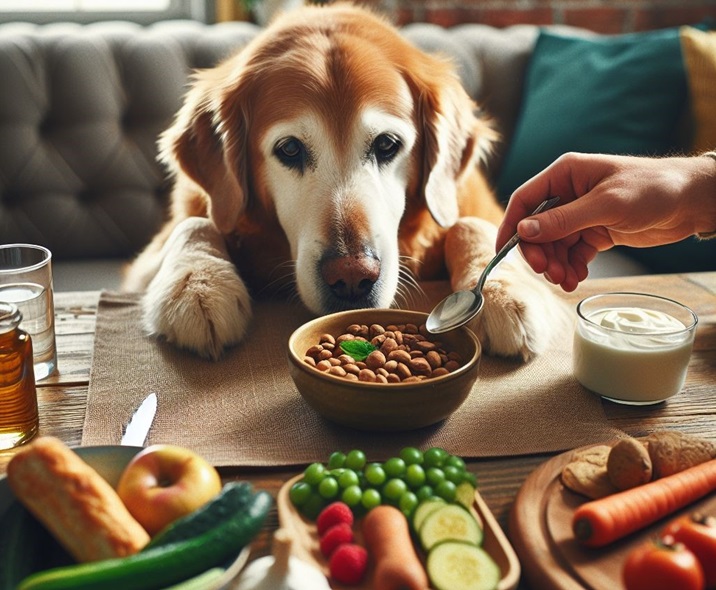Tailored nutrition and the best dog food for senior dogs. The keys to optimal health for senior dogs. As our beloved furry companions age, their nutritional needs evolve, requiring special attention to maintain their health and vitality. Just like humans, senior dogs benefit greatly from a balanced and tailored diet designed to support their changing bodies. While there are many commercial dog foods marketed for seniors, these may not always address the specific needs of individual dogs. This is where the expertise of a clinical canine nutritionist can make a significant difference, providing a personalized diet plan that meets your senior dog’s unique requirements.
Understanding the Needs of Senior Dogs
 As dogs enter their senior years, typically around seven to ten years of age depending on breed and size, they undergo various physiological changes. These changes can include decreased metabolism, changes in digestion and nutrient absorption, reduced muscle mass, joint issues, and potential dental problems. Additionally, certain medical conditions such as kidney disease, arthritis, or dental disease may become more prevalent in older dogs, further influencing their nutritional requirements.
As dogs enter their senior years, typically around seven to ten years of age depending on breed and size, they undergo various physiological changes. These changes can include decreased metabolism, changes in digestion and nutrient absorption, reduced muscle mass, joint issues, and potential dental problems. Additionally, certain medical conditions such as kidney disease, arthritis, or dental disease may become more prevalent in older dogs, further influencing their nutritional requirements.
The Importance of Proper Nutrition
Proper pet nutrition plays a crucial role in supporting the overall health and well-being of senior dogs. A diet tailored to their specific needs can help manage weight, support joint health, promote dental health, and provide essential nutrients to support cognitive function and a healthy immune system. While commercial dog foods may claim to address these needs, they often fall short in providing the precise balance of nutrients required for individual dogs. But what is the best wet food for senior dogs? What is the best dry dog food for senior dogs?
Customized Diet Plans: The Role of a Clinical Canine Nutritionist
 A clinical senior dog dietician is a professional with specialized knowledge in the nutritional needs of dogs. By consulting with a certified pet nutritionist, pet parents can gain valuable insights into their senior dog’s dietary requirements and receive a personalized diet plan tailored to meet those needs. This personalized approach takes into account factors such as the dog’s age, breed, size, activity level, existing health conditions, and any medications they may be taking. Benefits of a Personalized Diet Plan include:
A clinical senior dog dietician is a professional with specialized knowledge in the nutritional needs of dogs. By consulting with a certified pet nutritionist, pet parents can gain valuable insights into their senior dog’s dietary requirements and receive a personalized diet plan tailored to meet those needs. This personalized approach takes into account factors such as the dog’s age, breed, size, activity level, existing health conditions, and any medications they may be taking. Benefits of a Personalized Diet Plan include:
- Optimal Nutrition: A personalized diet plan ensures that senior dogs receive the right balance of nutrients to support their health and vitality.
- Tailored to Individual Needs: Each dog is unique, and a customized diet plan takes into account their specific requirements, ensuring that no nutritional deficiencies or excesses occur.
- Management of Health Conditions: For senior dogs with medical conditions such as arthritis or kidney disease, a customized diet plan can help manage symptoms and improve quality of life.
- Weight Management: Senior dogs are prone to weight gain due to decreased activity levels and metabolism. A personalized diet plan can help maintain a healthy weight and prevent obesity-related health issues.
- Improved Digestion: Aging can affect digestion and nutrient absorption in senior dogs. A tailored diet can include easily digestible ingredients to support gastrointestinal health.

Did you find this article useful? Would you like 100% free access to more articles like these, and free access to over 5,000 vetted pet care service professionals throughout the United States? Sign up here for a free Petworks account, and take 10% off your first booking, on us!
The Bottom Line on Senior Dog Diets
As our canine companions age, their nutritional needs change, requiring a diet that supports their health and well-being. While commercial dog foods may provide a convenient option, they often lack the customization needed to address the individual needs of senior dogs. By consulting with a clinical canine nutritionist and investing in a personalized diet plan, pet parents can ensure that their senior dogs receive the optimal nutrition they need to thrive in their golden years. Investing in tailored nutrition is not just an expense but a proactive step towards ensuring a longer, healthier, and happier life for our beloved companions.
About Us
 In 2021, Dr. Marty Goldstein DVM joined the pet care platform Petworks as an advisor in its Animal Nutrition care division. Dr Marty Nature’s Blend is on a mission to help your pets live their healthiest lives possible. Dr. Marty’s pet nutrition expertise and guidance has helped Petworks evolve and become the preeminent animal and pet nutrition consultation service for pet parents in North America.
In 2021, Dr. Marty Goldstein DVM joined the pet care platform Petworks as an advisor in its Animal Nutrition care division. Dr Marty Nature’s Blend is on a mission to help your pets live their healthiest lives possible. Dr. Marty’s pet nutrition expertise and guidance has helped Petworks evolve and become the preeminent animal and pet nutrition consultation service for pet parents in North America.
 In 2022, Blue Buffalo Founder Bill Bishop Jr. joined Petworks as Senior Advisor in our Animal Nutrition Care Division. Bill brings his extensive expertise in pet food innovation and business leadership. His guidance helps Petworks enhance our pet nutrition service offerings, helping to ensure that pet parents throughout the world receive trusted, science-backed nutritional support for their dogs, cats, and animals.
In 2022, Blue Buffalo Founder Bill Bishop Jr. joined Petworks as Senior Advisor in our Animal Nutrition Care Division. Bill brings his extensive expertise in pet food innovation and business leadership. His guidance helps Petworks enhance our pet nutrition service offerings, helping to ensure that pet parents throughout the world receive trusted, science-backed nutritional support for their dogs, cats, and animals.
About The Author
 Petworks Co-Founder Kevin Kinyon is a life-long animal lover who works tirelessly to improve the lives of pets and their parents. Human and animal qualities he values most are integrity, humor, and empathy.
Petworks Co-Founder Kevin Kinyon is a life-long animal lover who works tirelessly to improve the lives of pets and their parents. Human and animal qualities he values most are integrity, humor, and empathy.


